

What Are We Missing? Responsible policymakers try to plan ahead.
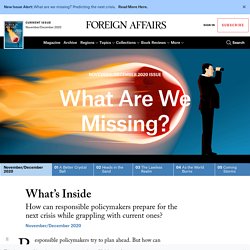
But how can they know what the next crisis will be, let alone prepare for it while still grappling with current ones? People are notoriously bad at anticipating the future, and countries aren’t much better. Our lead package this issue explores whether they can improve. Peter Scoblic and Philip Tetlock kick things off by pulling together decades of research on forecasting world politics.
They argue that people and governments can indeed train themselves to make better predictions. Next, Elke Weber shows how psychology works to undermine reason, both individually and collectively. Finally, top experts explore three issues on which today’s complacency could easily lead to tomorrow’s disaster: Marietje Schaake on cybersecurity, Michael Oppenheimer on climate change, and Christopher Layne on U.S.
In conversation with David McWilliams on the future after Covid-19 – The Guardian. Why the pandemic reminds us we need corporate foresight, before and during a crisis. By Alex Fergnani SINGAPORE — The COVID-19 pandemic has forced many firms to implement sudden operational changes.
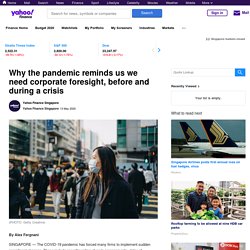
These include reconfiguration of work arrangements, delay of investment plans, and in some cases, letting go of workers. These measures, though necessary, are reactive. As managers were pressed with time for quick decisions amidst rapid changes, some reactions might not have led to the best decisions. A better alternative would be to implement proactive measures before a crisis happen. To be proactive doesn’t necessarily mean a need to predict the specific event of a pandemic. Welcome to the Future Nauseous. Both science fiction and futurism seem to miss an important piece of how the future actually turns into the present.

They fail to capture the way we don’t seem to notice when the future actually arrives. Sure, we can all see the small clues all around us: cellphones, laptops, Facebook, Prius cars on the street. Yet, somehow, the future always seems like something that is going to happen rather than something that is happening; future perfect rather than present-continuous. Even the nearest of near-term science fiction seems to evolve at some fixed receding-horizon distance from the present. There is an unexplained cognitive dissonance between changing-reality-as-experienced and change as imagined, and I don’t mean specifics of failed and successful predictions. My new explanation is this: we live in a continuous state of manufactured normalcy.
The Manufactured Normalcy Field Life as we live it has this familiar sense of being a static, continuous present. Factfulness. “The stress-reducing habit of only carrying opinions for which you have strong supporting facts.” — See the book Factfulness » Factfulness is a relaxing habit for critical thinking.
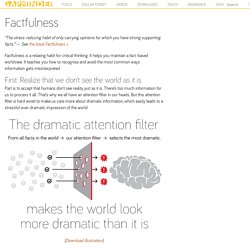
It helps you maintain a fact-based worldview. It teaches you how to recognise and avoid the most common ways information gets misinterpreted. First: Realize that we don’t see the world as it is. Part is to accept that humans don’t see reality just as it is. (Download illustration) Factfulness is the skill to recognise the common types of stories that tend to get all the attention because they trigger our dramatic instincts.
In the book Factfulness the three founders of Gapminder describe in practice how to use these rules of thumb in all kinds of situations and illustrate it with vivid stories from real life situations. Second: Recognise what types of stories trigger our dramatic instincts Third: Use simple rules of thumb to resist over-dramatic stories. The United Kingdom Has Gone Mad. Future - The perils of short-termism: Civilisation’s greatest threat. Not long after my daughter was born in early 2013, I had a sobering thought about the life that lay ahead for her.
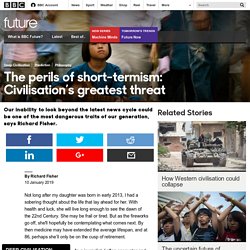
With health and luck, she will live long enough to see the dawn of the 22nd Century. Larry Fink's Letter to CEOs. Dear CEO, BlackRock is a fiduciary to our clients, helping them invest for long-term goals.
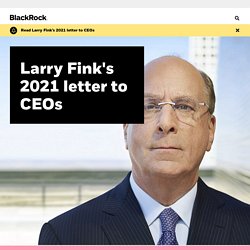
Most of the money we manage is for retirement – for individuals and pension beneficiaries like teachers, firefighters, doctors, businesspeople, and many others. It is their money we manage, not our own. The trust our clients place in us, and our role as the link between our clients and the companies they invest in, gives us a great responsibility to advocate on their behalf.
This is why I write to you each year, seeking to highlight issues that are pivotal to creating durable value – issues such as capital management, long-term strategy, purpose, and climate change. I began writing these letters in the wake of the financial crisis. The End of the World That 1948 Made. The span of our life is but seventy … (Psalms 90:10) 2018 was, on top of everything else, one long procession of 70th anniversaries of the raft of monumental events of 1948.
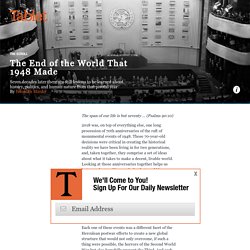
Those 70-year-old decisions were critical in creating the historical reality we have been living in for two generations, and, taken together, they comprise a set of ideas about what it takes to make a decent, livable world. Looking at those anniversaries together helps us better understand how and why that world is now coming apart, and what it might take to put at least some of it back together, and maybe even move forward. 1948 saw the creation of Israel; the promulgation of the Universal Declaration of Human Rights and the Genocide Convention; the General Agreement on Tariffs and Trade; the Berlin airlift and the desegregation of the U.S. military.